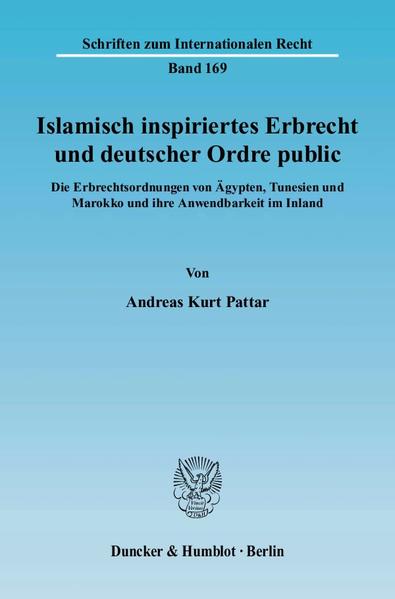PATTAR,A., Islamisch inspiriertes Erbrecht und deutscher Ordre public. Berlin 20
Islamisch inspiriertes Erbrecht und deutscher Ordre public. Die Erbrechtsordnungen von Ägypten, Tunesien und Marokko und ihre Anwendbarkeit im Inland. 1. Aufl. Berlin, Duncker & Humblot, 2007.
16 x 23 cm. 572 S. Abb.; 572 S. (Schriften zum Internationalen Recht, 169). ISBN 9783428122332.
Inhaltsübersicht: Einleitung – 1. Teil: Der Islam und das islamische Recht. Gemeinsamer Hintergrund Ägyptens, Tunesiens und Marokkos: Die Religion des Islams – Das islamische Recht (Šari?a) – 2. Teil: Das Erbrecht im klassischen islamischen Recht: Interreligiöses und interkonfessionelles Kollisionsrecht – Berufungsgründe – Umfang der Erbschaft (Tarika) – Eintritt des Erbfalls – Intestaterben (Wara?a): Erben kraft göttlichen Rechts – Erben kraft Testaments – Sonstige Gestaltungsmöglichkeiten – 3. Teil: Das Erbrecht im heutigen Recht Ägyptens, Tunesiens und Marokkos: Erbrecht nach ägyptischem Recht – Erbrecht nach tunesischem Recht – Erbrecht nach marokkanischem Recht – Gemeinsamkeiten und Unterschiede der betrachteten Erbrechtsordnungen – 4. Teil: Islamisch inspiriertes Erbrecht und deutscher Ordre public: Der Ordre-public-Vorbehalt im deutschen internationalen Erbrecht – Einzelfragen des Ordre-public-Vorbehalts – 5. Teil: Schlussbetrachtung – Zusammenfassung der Ergebnisse – Literaturverzeichnis – Stichwortverzeichnis
Order Number: 8195VB
Fixed Retail Price: EUR 99,90

